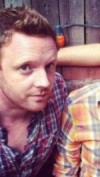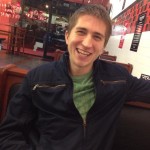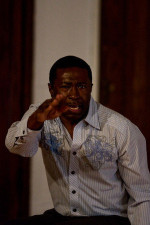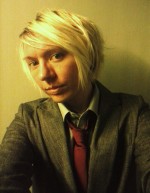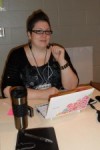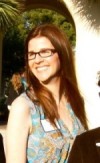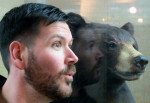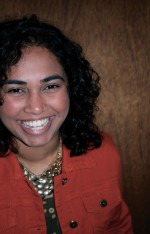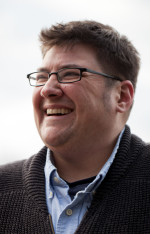Lambda’s Writers Retreat for Emerging LGBT Voices: The 2013 Fellows Reflect
Author: Edit Team
September 11, 2013
One of the most important initiatives the Lambda Literary Foundation undertakes is to support our up-and-coming writers. In the long run, maybe it’s our most important job. We do so through the Writers Retreat for Emerging LGBT Voices – this year in Los Angeles, July 28-August 4. After 7 years of existence, our retreat has earned a sterling reputation, and for good reason. Emerging lesbian, gay, bisexual and transgender writers need professional instruction and mentoring.
“Our Emerging Writers Retreat may be Lambda Literary’s most important program,” says LLF Executive Director, Tony Valenzuela. “With over 130 Lambda Literary Fellows now graduated since the program began in 2007, we are building a stellar community of queer writers who not only represent the future of LGBT literature, but who are writing and publishing today, actively involved in their queer literary communities all over the world.”
This year’s gathering offered a full week of intensive workshops and panel discussions, ranging from poetry to nonfiction. The teaching faculty included Samuel R. Delany (fiction), Malinda Lo Forrest (genre fiction and young adult fiction), Sarah Schulman (nonfiction), and David Groff (poetry).
We checked in with the some of this year’s participants and asked them to provide their own personal take on their time at the 2013 Voices Retreat:
Matthew Phillip
What amazed me the most about the retreat was the way everyone gelled so perfectly as a group both socially and creatively. By about the second or third day it was like we were all old friends. I was in a group with twelve vastly different, exceptionally talented, perceptive and articulate writers who paid such generous attention to my work. I came out the other end of my critique session shaken and uncomfortable but absolutely respected and cared for. It was the kind of critique that one longs for and only rarely receives. I am now clearer than I’ve ever been about how to progress with my work. Anything more comfortable than that would have been nowhere near as useful. There was also a lot of cake. Seriously. A staggering amount of it.
Eric Kossina
I was completely frightened at the thought of this retreat. People were going to read my soul, notice all my flaws, and then talk about them out loud. But our instructor, Chip, stroked his beard and thoughtfully, with a tick of his head, told us we are all here to improve, together, to cultivate a supportive environment we can use throughout our careers, to
inspire us, challenge us, and keep us going. I gave it a shot; and through a week of dedication, of workshops, of pressured, heart-wrenching work, I felt like a completely new writer. Writing is solitary work–we often discussed–between you and yourself, on a desk, a floor, a computer, on paper, by yourself alone in a room. And yet, Lambda made me feel part of a community that I hadn’t noticed in years. The staff at my fingertips, the dinners together, the excursions into the city, the LA experience, the hunger for real food, created a supportive atmosphere I would not have experienced anywhere else. Everyone is queer, everyone is a writer, and that’s the importance of this retreat–to look up and notice other people at the table. I am never writing alone. The final day forced me to analyze the spell we cast, that I would have to lock this feeling away, kidnap it, carry it around in my chest, remember it every time I sat down to write. I found a small but hopeful community who loved and invested in me, my success, and I theirs. Nothing else mattered.
LeVan D. Hawkins
When we sat around the room introducing ourselves at our first meeting, I told my fellow writers I was attending the Lambda Literary retreat to regain my enthusiasm. I had been working on my book for three years then following a disappointment, took a short break that turned into seven months. I had no idea that by the end of my short time at the retreat, I would find the appropriate beginning for my book, something I hadn’t been able to tie down in the three years I worked on my project.
When I talk about Lambda to others, I certainly will mention this but what I will remember most is the freedom I felt being in the midst of intelligent LGBT writers and poets and realizing the accommodations I had begun to make in my life for non-LGBT people. Finally, I could just be. It took me a few days to realize what I had been doing in my life. I had returned home to my small Midwestern town from West Hollywood, California to regroup careerwise for a few months then stayed for seven years to take care of my elderly mother. I had fled my town at seventeen for many reasons, one being it was a place where I didn’t feel free; there was so much pressure for everyone to be alike. When I left for the retreat, all I thought I needed was some time away, some focus on my work. I didn’t know I needed to be revived. That I wasn’t living. What helped me realize this, that I had been repressing myself was Non-Fiction Instructor Sarah Schulman passionately explaining what being mainstream really means and how if we don’t watch it, we will find ourselves sacrificing our voices and our lives to be accepted. I realized I had been doing that since I was home. That was why during the first day at the retreat, I found myself tightening in the face of freedom. Wow, they’re talking about that. I would never talk about that. After listening to Schulman, I began to relax, open up my heart, and allow my wounded teen to be healed and happy.
Schulman was a great teacher. It was great to watch someone who was expert in their work, someone that was so giving of herself, someone passionate that her students have the craft and life tools to express who they are. She also seemed to have knowledge about so many subjects including the work of LGBT writers of color. I was amazed at her range of knowledge.
That and listening to Tony Valenzuela speak at the People of Color Caucus gives me confidence that the Lambda Literary Retreat will continue to grow as a free place not just to the alphabets of LGBT but to the other identities underneath those alphabets.
Finally, I must acknowledge everyone tosses those alphabets around but Lambda Literary Retreat was a place that I saw the spectrum of those alphabets in a way I never had before.
Jessie Nash
I came to the retreat all the way from London. I was jet-lagged and exhausted, detained at border control, AND I forgot to pack socks. But waiting at the airport (for much longer than planned due to my hold-up) were two new friends who I hadn’t even met yet and were giving me a ride to the retreat. We even stopped for socks along the way.
I’ve been to a writer’s retreat before, but nothing could prepare me for how exhausted I’d feel at this one – you will be worked hard! Malinda Lo delivered an intense, fun, informative workshop where we learned about world-building and publishing, and critiqued our fellow writers work. It was one of the most constructive critiquing environments I’ve been in. Malinda’s expertise and fantastic sense of humor made me feel welcome and inspired. I met some truly amazing people who will now be my LGBT critique partners and collaborators, friends, and a community.
Being around so many talented and creative people was inspiring and I’ll remember many of the conversations (and the karaoke) for years to come. I’ll also remember the cafeteria food – who would have imaged that eggplant bake could bring us together? The overwhelming sense I got from my fellows at the LLF retreat is one of community and the feeling that we’re a writing force to be reckoned with. I’m proud to have met people who will be contributing so much to LGBT writing and I’m excited to see everyone’s work published in the future.
M-E Girad
I wanted (and needed) to go to the Lambda writers retreat for two reasons: 1) Because I knew that void in the development of many LGBT writers that the retreat was intended for was present in me, and 2) Because Malinda Lo announced that she would be the faculty for the YA/genre cohort. Let’s fast-forward to when I received my acceptance letter and my face actually split in half with glee, and fast-forward some more to when it was time to submit the first 40 pages of my manuscript to my YA/genre fellows and I only had 20 pages because I was intensely blocked with the rewrite of my work-in-progress. And then finally, I was there at the American Jewish University, surrounded by 50-something LGBT writers—fellows, faculty, and retreat organizers. What did I expect? I couldn’t even tell you at this point. What matters is what I got out of the experience. Besides leaving Canada for the first time ever (and tasting your horrid version of Heinz ketchup), I got to spend one week in a little village filled with queer writers, where every time I walked from the dorms, to the lecture hall, to the cafeteria, one or two or three of these people would be there to accept my gush of enthusiasm and then throw their own back at me. I got to engage in the types of conversations I’d only ever witnessed from a distance, usually from behind my laptop screen where I was too afraid to admit I didn’t know a whole lot, and even more afraid to ask questions. I got to talk about my work with Malinda Lo, an author I admire immensely. I got to then hear her and a group of fabulous YA/genre writers discuss my characters, my story, my writing, and hand me a bucket of feedback I could never put a price on. I found beta readers for my work, critique group partners, writers to collaborate with in the future, and people who are genuinely excited to read my work, whenever it becomes available out there. My head is filled with stories—fictional ones I read, ones that were read to me during the fellows readings, and personal stories of the amazing people I met throughout the week. I made some friends, friends that I would’ve likely never met any other way. And I got to have some ridiculous fun through it all (one word: karaoke). My experience at the Lambda writers retreat gave me confidence—confidence in my skill as a writer, in the strength of my work-in-progress, and in knowing my voice has a place out there in the world. I can only hope I gave back as much as I received from the experience.
Kristen Arnett
For someone who is generally isolated from the larger community of queer writers, this retreat was a revelation. I don’t have a lot of queer support in Florida and this occasionally drags me down. In Los Angeles at the LLF Retreat, I found this
community. These extremely talented and interesting individuals dissected all aspects of writing and theory. They were people who all brought different contributions to our larger circle and every idea was valuable. There were discussions of gender in writing, genre in writing, and theory in writing – even discussions of how pop culture works in queer circles, and how we can authenticate this in our work. I was worried that I would feel just as isolated as I often do at home; that I would spend time by myself and work through the familiar feelings of discomfort and stress. From day one I was welcomed and embraced by the wonderful people of Lambda and by my fellow cohorts. We ate meals together and talked together, and everyone was beautiful and inspiring. Chip Delany was an amazing mentor. He gave candid feedback and promoted thoughtful discussion in our workshop that allowed for honesty in our work and with each other. I wrote more that week than I had in the weeks prior to the retreat, and the feedback I received on my manuscript was so helpful and insightful – nothing overtly harsh or critical, just writers helping each other locate errors and find the best potential in their work. We all wanted each other to succeed, and I found that to be the most rewarding part of the entire retreat. I came away feeling rejuvenated and ready to write. I also came away with an entire support group of people that I am proud to know and to call my friends.
Jory Mickelson
The LLF Writers Retreat for Emerging LGBTQ Voices exceeded all of my expectations. Not only did I meet many other talented queer writers, but I also discovered a fellowship among us that transcended anything that I have experienced before at a writing workshop or retreat. Although our backgrounds run the gambit of race, class, gender, and privilege, there remains a commonality of experience among us. We have all confronted the fact that our voices, interests, and concerns as queer writers are not only marginal in mainstream literature, but that many times we experience less support or even hostility to telling our truths on the page. This shared bond allowed me to write about topics that I might not have risked in another workshop. As a gay man who has been out for more than eighteen years, I didn’t think that there was anything that I was holding back on putting down on paper; yet the LLF retreat provided a secure place to take even greater leaps with my poems. The most inspiring moments for me were the afternoon and late night writing sessions with other poets from my workshop. We fellows were free to do whatever we wanted during these open periods, yet many of us got together and continued to write, occasionally sharing work, telling stories, and laughing. To see a common dedication to the craft of writing by other queer poets will stick with me for a long time. It will carry me through the periods of lonely writing at home. It will remind me that in order to do the work, other things must be sacrificed. I will continue to picture my fellows surrounding me, supporting me, and believing in my commitment to what I have to say on the page despite the daily tide of busyness, self-doubt, and rejection that every writer faces. We came together at LLF, and even though we have now parted, some small portion of the Writers Retreat remains within us, pushing us forward, though not nearly as alone as before.
SJ Sindu
Attending the Lambda Writers Retreat for Emerging LGBT Voices was one of the best decisions I’ve ever made. Not only did I get to spend a week learning from Sarah Schulman, but I also got to meet a group of fantastic, brilliant writers who are going to change the world. I felt connected to the queer community in a way I haven’t ever felt before. I made connections, and
more importantly, I made friends. This year we held the very first Queer Writers of Color Caucus to discuss issues particular to the community. This retreat is about more than just learning craft, though that’s important, too. This retreat is also about getting plugged into the queer writing community, about finding and creating family, and about helping each other to achieve success, whatever that may look like to each person. We have an amazing array of talented voices in our community, and I can’t wait for what the future of LGBT literature holds.
Everett Maroon
I arrived on campus with two main expectations—solve the problems of my novel-in-progress, and network with the Fellows and Faculty. No wait, I also wanted to learn as much as I could from Samuel Delany, so I guess I had three expectations. Well, expectations isn’t right. They were goals. Goals, I had three goals. Solve novel problems, learn from Mr. Delany, and network. But I also wanted time to write. So there were four goals. Solve problems, learn from Chip, network, and write. Yeah, that was it. I mean, there were other things I wanted to do too, but they were smaller, more like a to do list than capital “G” Goals. Anyway, Lambda Literary
Foundation’s Emerging Writer Workshop (you folks need a shorter name or something, honestly) blew away those expecta—I mean goals. I figured out the issues with my manuscript, I met and connected with four dozen writers, all of whom in aggregate are creating the next generation of LGBT literature, I banged out several thousand new words, and I learned more
than I thought possible from Mr. Delany, who is an extremely careful reader. I told him that I will probably spend the next five years writing for his eyes and ears. He responded with, “Well, you could do worse.” I can’t think of another time that I’ve seen critique executed so carefully, nor with so much support and love of writing. Working on a complicated novel with four main characters is tricky to say the least, but my fiction fellows had specific feedback that gave me insight I couldn’t generate on my own. I also benefitted from reading everyone else’s work—some pieces were stream of consciousness, almost beat poetry. Others were more linear, and all of them were chock full of imagery and thoughtful character work which will stay with me for some time. Between critiques and lectures from publishing professionals, the workshop exceeded all of my big Goals and my long to do list. Thank you, LLF, for the opportunity. The life-changing opportunity.
Marcie Bianco
Reflecting on my time at the 2013 Writers Retreat, I can’t help but to recall Fran Lebowitz’s observations about the “lost generation” of literary and visual artists (and the consequential loss of a “discerning audience”); a generation lost because of the HIV/AIDS epidemic that ravaged the LGBT community in the 80s and 90s. As I witnessed this year’s Fellows perform their readings this week, my heart feels that our artistic community—as well as our discerning audience”—is in fact rebuilding itself.
Most LGBT creative types do not have the means, financial or otherwise, to engage in their writing for a sustained period of time. The Retreat not only afforded “a room of one’s own,” but daily, three-hour, workshops with a designated generic cohort (Fiction, Non-Fiction, YA/Genre, and Poetry) to work through formal and aesthetic issues with one’s writing. As an admirer of Sarah Schulman’s work ethic and dedication to community building, I was honored to receive her critiques of a handful of excerpts of my manuscript. Just as valuable were the critiques of the 11 individuals of my cohort—with whom I feel a profound connection. We are dedicated to our own work as well as each other’s; while the week is now over, our support of each other’s work will continue online as a virtual workshop. I am dedicated to helping each of their projects reach fruition.
The mornings were reserved for our genre specific workshops. In the Non-Fiction Workshop, each individual read a 10-page excerpt of a manuscript-in-progress, followed by a general discussion, during which time the cohort offered constructive criticism. We followed this round of draft critique with a second, post-revision, round. I loved the daily workshops and actually wish we had a second workshop scheduled in the evenings.
That said, I would not substitute Tuesday night’s screening of Sarah Schulman’s and Jim Hubbard’s “United in Anger” for anything. As a lesbian who was born in 1980 in a rural, white-trash town in South Jersey, I never felt connected to this part of LGBT history. I just couldn’t understand how the HIV/AIDS epidemic was a part of my individual history. The documentary “How to Survive a Plague” reinforced the feeling that HIV/AIDS affected one segment of our community—rich, gay, white men. But “United in Anger” exposed me to the reality of HIV/AIDS: that it affected everyone, men and women; rich and poor; gay, straight, and everything in between. To see footage of gay men campaigning for and protesting on behalf of women’s health absolutely blew my mind. This screening was a transformational moment for me—but not the only one.
After the Retreat, I have a renewed commitment to both my craft and my community—the entire LGBT community. And, for helping me to recalibrate my personal and political ethics, I am forever grateful to Lambda.

